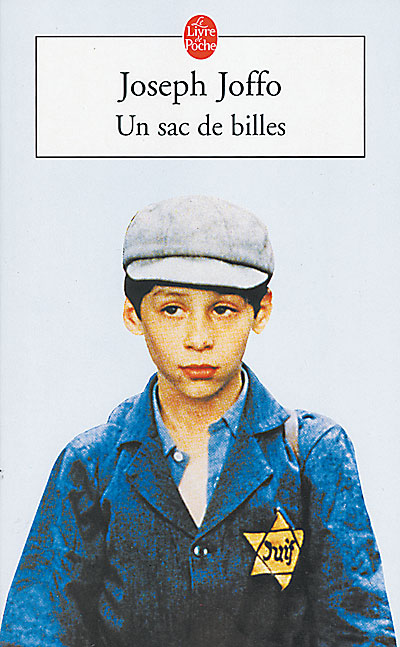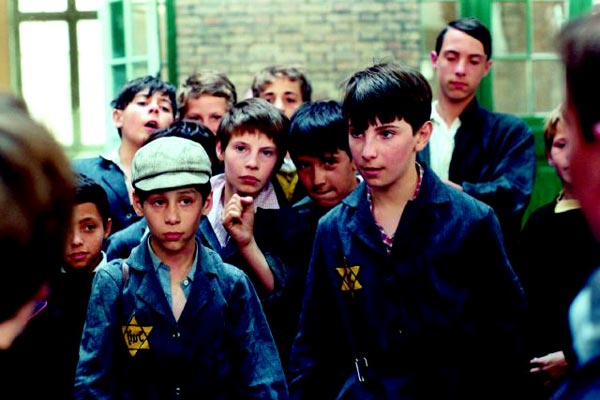
posted by Simon Kemp
Joseph Joffo’s memoir of his time as a Jewish ten-year-old on the run with his older brother in Nazi-occupied France is justifiably famous, and it seems to be a popular choice among the set texts on the new A-level syllabus. As the first in our series answering questions about these texts, let’s see why the book has the title un sac de billes, given that marbles don’t feature in the book beyond the opening chapters.
Marbles are, of course, where we start in the story, with the game being played in the street between Jo and Maurice. Why start the story at this moment? Well, the episode is filled with foreshadowing of the story to come:
- Maurice and Jo will return from the game to find two S. S. officers at their father’s barber shop, leading to their first real encounter with the Nazis and their antisemitism.
- The game of marbles itself is watched by Mémé Epstein, who, Joffo mentions, is a Jewish woman who has found safe haven in Paris from the pogroms, attacks on Jewish people in Russia and Eastern Europe earlier in the century. A repeated theme in the story will be the fact that this kind of mass persecution of the Jews has happened before (including to Jo’s Russian grandfather), and that means it could happen again in the future.
- And, most clearly, marbles come to symbolize the bond between the brothers. Maurice wins Jo’s last marble off him, fair and square, but, knowing how much he likes it, gives it back to him:
Un frère est quelqu’un à qui on rend la dernière bille qu’on vient de lui gagner.
The bond between the two boys is a central theme of the story, and their concern for each other is what will allow them to survive the coming ordeal.
The returned marble itself is also rather special. It looks a little like a miniature globe, and Jo likes to pretend he has the world in his pocket:
Il est bon d’avoir la Terre dans sa poche, les montagnes, les mers, tout ça bien enfoui. Je suis un géant et j’ai sur moi toutes les planètes.
There’s not much in the way of symbolism or metaphor in Joffo’s memoir, but this is one definite symbol. The world-marble gives Jo a fantasy of immense power, which is ironic as his extreme powerlessness is about to be brought home to him. But there’s also the fact that there actually is now a giant holding the whole planet in its grip, metaphorically at least. Fascism’s influence over the world, its threat to humanity as a whole, and its pervasive power that can’t be escaped, no matter how far you run, is implicit in the image.
But hang on a minute… what about the bag?
There’s no bag of marbles in the opening scene. In fact, Joffo specifies that the marbles are in Maurice’s pockets, which are bulging with them : ça lui fait des poches comme des ballons.
So where’s the bag of marbles?

It turns up in Chapter Three, in a much briefer scene than the opening marbles game, but one that reinforces many of the same themes. Jo has gone to school with a yellow star sewn onto his clothes for the first time, and as a result has found himself insulted by his classmates, ignored by his teacher, and finally, beaten up in the playground. His non-Jewish friend Zérati, who feels guilty at having drawn attention to Jo’s star in the first place, runs after him and proposes a trade:
Mon étoile. Pour un sac de billes.
The marbles are handed over in another act of kindness : not between brothers this time, but between Jo and a non-Jewish person, foreshadowing the unexpected kindness the brothers will encounter from French people as they travel, and perhaps showing a better world of common humanity that the coming years will very nearly snuff out entirely.

So the marbles play a double role in the story, covering the twin themes of the book: on the one hand, immense power holding the world in its grasp in Jo’s fantasy, and its flipside of vulnerability in Jo’s real status, and on the other hand, the solidarity that will enable Jo and Maurice to survive the années noires of the Occupation.
And as well as all this, the marbles are just what you know marbles are: a children’s game. Perhaps that game in the street, just before meeting the S. S. officers at their home, is the last true moment of childhood in Jo’s life. Certainly, his childhood is over a little while later as he leaves home with his brother. Looking back, Joffo remarks of that night:
C’en était fait de l’enfance.
His childhood is over, not only because he will lose the security of home and the care of his parents, as he has to fend for himself in the world. It’s also over because any childhood illusions he may have had – that grown-ups are wise and good, perhaps, or that the world is a safe and predictable place – are about to be brutally dispelled.
There’s a reason marbles don’t feature in the book beyond the opening pages. They’re for children, and Joseph Joffo’s childhood ended at the age of ten.

The request for an imposed Jewish badge in exchange for a bag of marbles also recalls (though not suggested by the memoirist) the account in the book of Exodus (12:35) of the departing Hebrew slaves asking and receiving from Egyptian neighbors gifts of cloaks and precious metals. In both instances, giving is a counter-current in an otherwise cruel and oppressive society and a precursor of later kind acts to the two fleeing brothers.